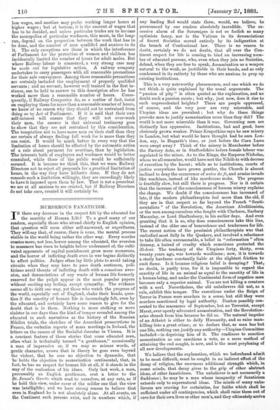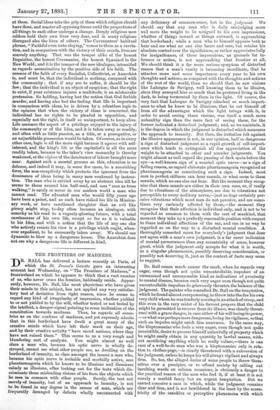MURDEROUS FANATICISM.
IS there any decrease in the respect felt by the educated for the nudity of Human Life? To a good many of our readers, especially those who attend chiefly to English opinion, that question will seem either self-answered, or superfluous. They will say that, of coarse, there is none, the mental process visible in the world being rather the other way. Every murder creates more, not less, horror among the educated, the aversion to massacre has risen to heights before undreamed of, the culti- vated opponents of capital punishment grow more numerous, and the horror of inflicting death even in war begins distinctly to affect politics. Judges often lay little plots to avoid taking circuits when they may have to pass death sentences, poli- ticians avoid threats of inflicting death with a conscious aver- sion, and denunciations of any waste of human life formerly reserved for the pulpit appear in the most popular papers without exciting any feeling, except -sympathy. The evidence seems all to drift one way, yet those who watch the progress of the world, especially out of England, shake their heads, ques- tion if the sanctity of human life is increasingly felt, even by the educated, and certainly have some reason to give for the doubt that is in them. Nothing is more striking or more sinister in our days than the kind of temper revealed among the educated in such narratives as the history of the Russian Nihilist trials, the sketches of the Anarchist prosecutions in France, the verbatim reports of mass meetings in Ireland, the letters on the causes of the Socialist emeutes in Vienna. It is a constant feature of those stories that some educated man, often what is technically termed "a gentleman," occasionally a man of impressive or, if we may so misuse words, of gentle character, avows that in theory he goes even beyond the violent, that he sees no objection to dynamite, that he holds the objection to assassination sentimental, that, in fact, he has no respect for human life at all, if it stands in the way of the realisation of his ideas. Only last week, a man, presumably an English gentleman, sent a letter to the St. James's Gazette which read to ourselves, at any rate, as if he held this view, under cover of the milder one that the view was intelligible; and we have strong reason to believe that even in England he is not absolutely alone. At all events, on the Continent such persons exist, and in numbers which, if any leading Red would state them, would, we believe, be pronounced by our readers absolutely incredible. The ex- cessive alarm of the Sovereigns is not so foolish as many optimists fancy, nor is the Vatican in its denunciations of Secret Societies moved entirely by its indignation at the breach of Confessional law. There is no reason to doubt, certainly we do not doubt, that all over the Con- tinent respect for life is ceasing to bind an increasing num- ber of educated persons, who, even when they join no Societies, defend, when they are free to speak, Assassination as a weapon natural to the weak, as justifiable in their hands, and as only condemned in its entirety by those who are anxious. to prop up existing institutions..
This is a very noteworthy phenomenon, and one which we do not think, is quite explained by the usual arguments. The "passion of pity" is often quoted as the explanation, and no doubt such a passion exists ; but why, just now, does it rise to such unprecedented heights ? There are people oppressed, of course, and the very poor are very miserable, and Utopian ideas are prevalent ; but why do these things provoke men to justify assassination more than they did? The world is not more miserable than it was. Governing men are distinctly less oppressive. Institutions, bad and good, have obviously grown weaker. Prince Krapotkine says he saw misery in London, but what would he have thought had he seen Lon- don, say, in Hogarth's time, or just before the Corn Laws were swept away ? Think of the misery in Manchester before the Factory Acts, or in Staffordshire before female labour was regulated in the mines. As to the Kings, the Emperor Nicholas, whom we all remember, would have met the Nihilists with decrees of execution by the knout; while as to institutions, courts of justice everywhere have grown gentler, the Church is almost inclined to deny the occurrence of autos da fe, and armies invade like machines, instead of like murderous mobs. The progress is fearfully slow, but still there is progress. Nor is it certain that the increase of the consciousness of human misery explains the change. We doubt if the consciousness has increased of late, if the modern philanthropists feel more than the old, if they are in that respect so far beyond the French " Senti- mentalists " of the Revolution, the American Abolitionists, or the men among ourselves who fought with Clarkson, Zachary Macaulay, or Lord Shaftesbury, in his earlier days. And even granting that it is so, why does consciousness take this line, instead of the older one of benevolence and tenderness for life. The recent notion of the pessimist philanthropists was that embodied most fully in the Quakers, and involved a reluctance to take life often unreasonable, a belief in "reformation" often dreamy, a hatred of cruelty which sometimes protected the ill-doer. The tendency of the Utopians forty, thirty, even twenty years ago, was towards woolliness; now, it is towards a steely hardness constantly liable at the slightest friction to emit flame. Is it because religious belief is decaying? That, no doubt, is partly true, for it is impossible to regard the sanctity of life in an animal as equal to the sanctity of life in a human being, and under the Continental form of negation man becomes only a superior animal. You are not killing a creature with a souL Nevertheless, the old unbelievers did not, as a rule, exhibit this temper. The executions under the Reign of Terror in France were murders in a sense, but still they were murders sanctioned by legal authority. Denton possibly con- sented to the massacres of September, but no Terrorist, except Marat, ever openly advocated assassination, and the Revolution- aries shrank from him because he did so. The natural impulse of an Atheist is either to deify Humanity, and so raise man- killing into a great crime; or to declare that, as man has but one life, nothing can justify any authority—Utopian Committee included—in depriving him of it. The readiness to sanction assassination as one sanctions a vote, as a mere method of attaining the end sought, is new, and is the most perplexing of all new developments.
We believe that the explanation, which we beforehand admit to be most difficult, must be sought in an indirect effect of the decay of religion, the enormous additional strength which, in some minds, that decay gives to the grip of other abstract ideas, of other fanaticisms. The unbeliever is not necessarily a Sadducee-; he may be a man whose incapacity of fanaticism extends only to supernatural ideas. The minds of many unbe- lievers are craving for certainties, for faiths which shall be sufficient under all contingencies, which shall raise them out of care for their own lives or other men's, and they ultimately arrive at them. Social ideas take the grip of them which religion should have done, and master all opposing forces until the proportions of all things to each other undergo a change. Deeply religions men seldom hold their own lives very dear, and in many religions disregard also the lives of others. The Covenanters' habitual phrase, "Faithful even unto slaying," comes to them as a revela- tion, and in comparison with the victory of their creeds, lives are scarcely anything. That was the temper alike of the honest Inquisitor, the honest Covenanter, the honest Spaniard in the New World; and it is the temper of the new idealogue, intensified as regards assassination by the positive side of his faith. The essence of the faith of every Socialist, Collectivist, or Anarchist is, and must be, that the individual is nothing, compared with the community ; that if any are to suffer, it should be the few ; that the individual is an object of suspicion ; that the right to exist, if your existence injures a multitude, is an aristocratic pretension. So holding, having lost the notion that God forbids murder, and having also lost the feeling that life -is important in comparison with ideas, he is driven by a relentless logic to the opinion that when the .victory of ideas is concerned, the individual has no rights to be pleaded in opposition, and especially not the right, in itself so unimportant, to keep alive. Life assumes the aspect of a privilege enjoyed to the injury of the community or of the Idea, and it is taken away as readily, and often with as little passion, as a title, or a prerogative, or an unjustifiable possession would be taken. Of course, as in every other case, logic is all the more rigid because it agrees with self- interest, and the king's life or the capitalist's is all the more readily taken, because in the taker's view monarchy is thereby weakened, or the rggime of the dominance of labour brought more near. Against such a mental process as this, education is no defence, and indeed it may, in some few cases, be a nourishing force, the non-receptivity which protects the ignorant from the dominance of ideas being in many men weakened by instruc- tion. The man who is carried away by an abstract idea till he seems to those around him half-mad, and sees "men as trees walking," is rarely or never in our modern world a man who cannot read. The educated man who would fifty years ago have been a priest, and as such have risked his life in Mission- ary work, or have sanctioned slaughter that an evil like piracy might stop, to-day often becomes an idealogue, with anarchy as his road to a vaguely-glowing future, with a total carelessness of his own life, except so far as it is valuable to his Idea, and with a notion that the life of any one else who actively resists his view is a privilege which ought, when- ever expedient, to be summarily taken away. We should use dynamite to blow up a dangerous house. The Anarchist does not see why a dangerous life is different in kind.







































 Previous page
Previous page